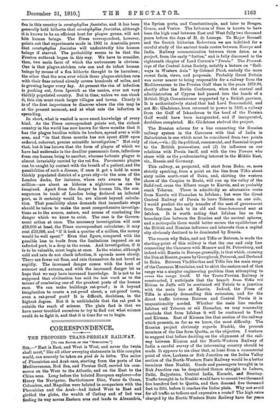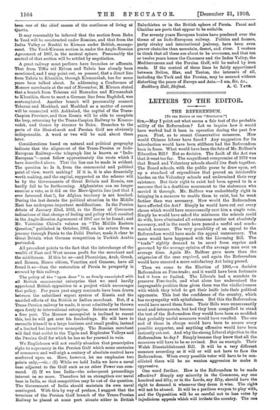CORRESPONDENCE.
THE PROPOSED TRANS-PERSIAN RAILWAY.
[To THZ EDITOR or THS "SPECTATOR."]
Sin,—" East is East, and West is West, and never the twain shall meet," like all other sweeping statements in this complex world, can scarcely be taken au pied de la lettre. The sailor of Phoenician and Arab race, starting from the ports of the Mediterranean, Red Sea, and Persian Gulf, carried his com- merce on the West to the Atlantic, and on the East to the China seas. Long before the belated European explorer—for Henry the Navigator, Bartholomew Diaz, Vasco da Gama, Columbus, and Magellan were belated in comparison with the Phoenician and the Arab—had linked West to East and girdled the globe, the wealth of Cathay and of Ind was finding its way across Eastern seas and lands to Alexandria,
the Syrian ports, and Constantinople, and later to Bruges, Genoa, and Venice. The Isthmus of Suez is known to have been the high road between East and West fully two thousand years before the days of M. de Lesseps. To Major Rennell and the Scotch historian Robertson we are indebted for a careful study of the ancient trade routes between Europe and India. Railway communication between them dates, as a project, from the early "forties," and is fully discussed in the eighteenth chapter of Lord Curzon's " Persia." The Proceed- ings of the Central Asian Society, notably a lecture on "Rail- ways in Western Asia" by Colonel Picot, embody the more recent facts, views, and proposals. Probably Great Britain was never nearer to being responsible for a railway from the Mediterranean to the Persian Gulf than in the years 1878-80, shortly after the Berlin Conference, when the control and administration of Cyprus had passed into the hands of a British High Commissioner supported by a British garrison. It is authoritatively stated that had Lord Beaconsfield, and not Mr. Gladstone, been returned to power in 1880, a railway from the Gulf of Iskanderun to the head of the Persian Gulf would have been inaugurated, and if inaugurated, doubtless, completed. Mr. Gladstone shelved the project.
The Russian scheme for a line connecting the Russian railway system in the Caucasus with that of India in Baluchistan is one which must be considered from two points of view,—viz.: (1) its political, commercial, and financial import to the British possessions, and (2) its influence on our relations with Persia itself, and with the two Powers who share with us the predominating interest in the Middle East, viz., Russia and Germany.
This railway, as projected, will start from Baku, or, more strictly speaking, from a point on the line from Tiflis about sixty miles south-west of Baku, and, skirting the western shore of the Caspian to Resht, will run up the valley of the Safid-rud, cross the Elburz range to Kazvin, and so probably reach Teheran. There is admittedly an alternative route from Kazvin via Hamadan to Isfahan ; but were the Great Central Railway of Persia to leave Teheran on one side, I would predict the early transfer of the seat of government from Teheran back to its old and time-honoured seat at Isfahan. It is worth noting that Isfahan lies on the boundary-line between the Russian and the neutral spheres, and a metropolis there would better secure the equilibrium of the British and Russian influence and interests than a capital city obviously destined to be dominated by Russia.
The reason why Baku, and not Tiflis or Batoum, is made the starting-point of this railway is that the one and only line connecting the Caucasus with Moscow and St. Petersburg, and indeed with Russia in Europe generally, is that which, crossing the Don at Rostov, passes by Georgievsk, Petrovsk, and Derbend to Baku. Between Vladikavkas and Tiflis lies the main range of the Caucasus Mountains, and to skirt the eastern end of that range was a simpler engineering problem than attempting to cross the range itself. If the Trans-Persian Railway is constructed, I anticipate that the branch from Tithes via Erivan to Julia will be continued via Tabriz to a junction with the main line at Kazvin. Indeed, the Press of Tiflis is already demanding this extension, and for the direct traffic between Batoum and Central Persia it is unquestionably needed. Whether the main line reaches Isfahan via Teheran or via Hamadan, we may reasonably conclude that from Isfahan it will be continued to Yezd and Kirman. East of Kirman lies that section of the railway which presents, as far as we know, the most difficulty. The Russian project obviously regards Nushki, the present terminus of the line from Quetta, as the objective. I venture to suggest that before deciding on the alignment of the rail- way between Kirman and the North-Western Railway of India a careful survey of the intervening country should be made. It appears to me clear that, at least from a commercial point of view, Larkana, or Ruk Junction on the Indus Valley section of the North-Western State Railway would be abetter terminus than Nushki. Goods and passengers brought in to Ruk Junction can be despatched thence straight to Lahore, Delhi, Rajputana, Central India, Karachi, and Bombay. Traffic brought in to Nushki would have to mount two thousand five hundred feet to Quetta, and then descend five thousand feet to Sibi, before it reaches the Indus plain. Why not avoid for all traffic so tedious and expensive a route ? The high rates charged by the North-Western State Railway have for years
been one of the chief causes of the costliness of living at Quetta.
It may reasonably be inferred that the section from Baku to Yezd will be constructed under Russian, and that from the Indus Valley or Nushki to Kirman under British, manage- ment. The Yezd-Kirman section is, under the Anglo-Russian Agreement of 1907, in the neutral sphere. Presumably the control of that section will be settled by negotiation.
A great railway must perforce have branches or affluents. That from Tiflis vat Erivan and Tabriz has already been mentioned, and I may point out, en passant, that a direct line from Tabriz to Khanikin, through Kirmanshah, has for some years been talked about In addressing a Conference of Moscow merchants at the end of November, M. Klemm stated that a branch from Teheran via Hamadan and Kirmanshah to Khanikin, there to meet a German line from Baghdad, was contemplated. Another branch will presumably connect Teheran and Mashhad, and Mashhad as a matter of course will be connected with Ashkabad, the capital of the Trans- Caspian Province, and thus Russia will be able to complete the loop, returning by the Trans-Caspian Railway to Krasno- vodsk, and thence by steamer to Baku. Branches to the ports of the Shat-el-arab and Persian Gulf are obviously indispensable. A word or two will be said about these later.
Considerations based on natural and political geography indicate that the alignment of the Trans-Persian or Indo- European Railway—the telegraph line is known as "Indo- European "—must follow approximately the route which I have described above. That the line can be made is evident. The question is: Is it, from the commercial and political point of view, worth making? If it is, it is also financially worth making, and the capital, supported as the scheme will be by the Governments of Great Britain and Russia, can hardly fail to be forthcoming. Afghanistan can no longer exercise a veto, as it did on the Merv-Quetta line (not that I ever favoured that !), for Afghan territory is not touched. During the last decade the political situation in the Middle East has undergone important modifications. In the Persian debate of January 22nd, 1902, in the House of Commons indications of that change of feeling and policy which resulted in the Anglo-Russian Agreement of 1907 are to be found; and Mr. Valentine Chirol's volume on "The Middle Eastern Question," published in October, 1903, on his return from a journey through Persia to the Delhi Durbar, made it clear to Great Britain what German competition in Turkish Arabia portended.
All precedent points to the fact that the interchange of the wealth of East and West means profit for the merchant and the middleman. If this be so—and Phoenician, Arab, Greek, and Roman, Hanse citizen, Venetian and Genoese, have all found it so—then the restoration of Persia to prosperity is secured by this railway.
The policy of the "open door" is so firmly associated with all British commercial enterprise that we need hardly apprehend British opposition to a project which encourages that policy. For years past angry contrasts have been drawn between the subsidised export system of Russia and the unaided efforts of the British or Indian merchant. But, if a Trans-Persian railway be made, it must admittedly be thrown open freely to international enterprise. Batoum must become a free port. The Moscow monopolist is inclined to resent this, but he will get over his forebodings. He will have to reconcile himself to a large business and small profits, instead of a limited but lucrative monopoly. The Russian merchant will find that outlet to the Tigris and Euphrates Valleys and the Persian Gulf for which he has so far yearned in vain.
We Englishmen will not readily abandon that prescriptive right to supremacy in the Persian Gulf which some centuries of commerce and well-nigh a century of absolute control have conferred upon us. Here, however, let me emphasise two points only,—viz. : (1) While we hold India we have a naval base adjacent to the Gulf such as no other Power can com- mand. (2) If we lose India—the subsequent proceedings interest us no more. Therefore let us strengthen our naval base in India, so that competition may be out of the question. The Government of India should maintain its own naval contingent. With this by way of preface, I suggest that the terminus of the Persian Gulf branch of the Trans-Persian Railway be placed at some port situate either in British Baluchistan or in the British sphere of Persia. Pasni and Cluthbar are ports that appear to be suitable.
For seventy years European brains have pondered over the theme of an Indo-European railway. Politics and finance, party rivalry and international jealousy, have been even graver obstacles than mountain, desert, and river. I venture to think that all these are about to be overcome, and that ten or twelve years hence the Caucasus and the Indus Valley, the Mediterranean and the Persian Gulf, will be united by iron roads. If the control of these lines be fairly apportioned between Briton, Slav, and Teuton, the interests of all, including the Turk and the Persian, may be secured without disturbing the peace of Europe and Asia.—I am, Sir, &a,







































 Previous page
Previous page